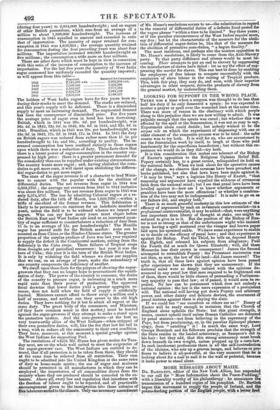LOOKING FOR SUPPORT IN THE WRONG PLACE. THERE was a
time when a surgeon was thought to do less than half his duty if he only fomented a sprain : he was expected to mutter a prayer or spell over the wounded limb at the same time. There was more of reason in the obstinacy with which people clung to this prejudice than we are now willing to admit. It was palpable enough that the sprain was cured ; but whether this was effected by the spell or the fomentation, it was not so easy to say. Experiment alone could decide ; but nobody wished to be the corpus vile on which the experiment of dispensing with one or other element of the composite process was to be tried : the safer course was to try both. It is well for us, who are accustomed to see the fomentation work by itself, to laugh at those who paid handsomely for the superfluous benediction ; but without this ex- perience we would do as they did—try both. It is this consideration that makes one tolerant of the Bishop of Exeter's opposition to the Religious Opinion Relief Bill. Popery certainly has, to a great extent, relinquished its hold on the national faith. When we look about for the operative causes of the change, we observe that sermons have been preached and books published, but also that laws have been made against it. " It may be true," says a logician like Henry of Exeter, "that reasoning and argument have expelled the sickness of erroneous faith from the national mind ; but I see that penal laws have been levelled against it—how am I to know whether arguments or penalties have been the more efficacious ? or whether a combina- tion of the two may not be indispensable? It is safer to go on as our fathers did, and employ both." There is so much graceful modestpin this low estimate of the efficacy of argument by such an inveterate controversialist—in a professional controversialist, it may be added—that, were anything less important than liberty of thought at stake, one might be seduced to give in to it. But the position of the Bishop of Exe, ter is not so strong as that of the unfortunate wight who insisted upon having a spell muttered over the vinegar and brown paper laid upon his sprained ankle. We have some experience to enable us to decide on the efficacy of penal laws ; and that experience is against the Bishop. Paul the Third, he tells us, deposed Henry the Eighth, and released his subjects from allegiance; Paul the Fourth did as much for Queen Elizabeth : well, did these Monarchs lose their crown in consequence? James the Second attempted to reestablish Popery : the Protestant succession was not then, as now, the law of the land—did James succeed ? The truth is, that all these laws against opinion have been passed after experience has shown that they are unnecessary. If the national mind were so deeply imbued with the opinions de• nounced in any penal law that men required to be frightened out of them, there would be little chance of persuading a Parliamen- tary majority to pass that law ; or if passed, it would soon be re. pealed. No law can be permanent which does not embody a national opinion : the law is the mere expression of a preexistent will. The national will having put down Popery and arbitrary power, and other dainty and delicate devices, the enactment of penal statutes against them is slaying the slain. If we could but " see ourselves as others see us !" Henry of Exeter will be ready enough to maintain that the Church of England alone upholds the State : but this giant strength, it seems, cannot uphold itself unless Roman Catholics are debarred by penal statutes—not from believing in the supremacy of the Pope, but from proclaiming, or, in the peculiar Episcopal phrase- ology, from " extolling' it In much the same way, Lord George Bentinck and his followers proclaim that the strength of the State resides in the landed aristocracy, as Sampson's did in his hair : but they add, that this strong aristocracy must break down beneath its own weight, unless propped up by a corn-law, In such incoherent professions there is all the self-contradiction of the idolater, who sets up a graven image, and believes-or pro= fesses to believe it all-powerful, at the very moment that< he is looking about for a nail to nail it to the wall or pedestal, because it lacks power to stand alone.


























 Previous page
Previous page